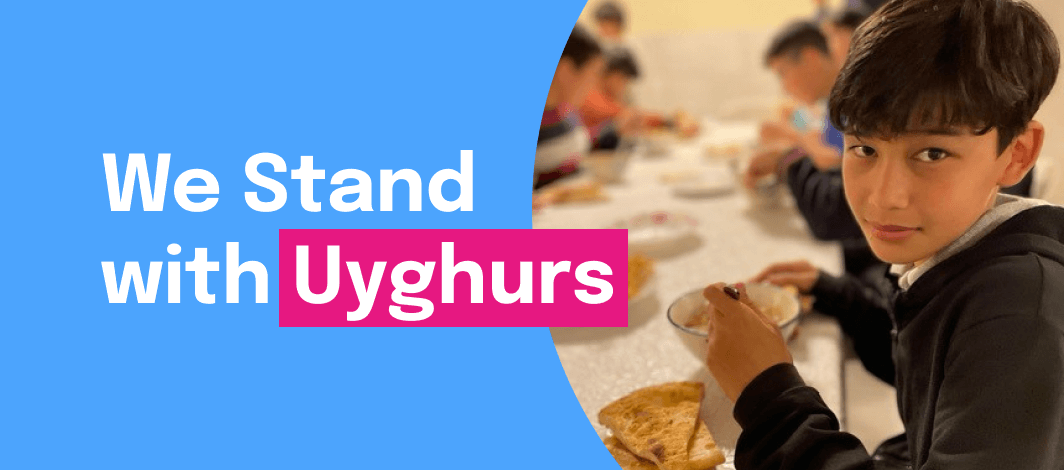Mothers separated from children. Religion restricted. Daily life a struggle to survive in a high-surveillance police state.
People are slowly starting to learn about the atrocities committed against the Uyghur people.
Earlier this week, the BBC reported about a giant cache containing thousands of photos and documents from a data hack of police files in China. It clearly highlights the extent of their secretive and systemic incarceration and abuse of the Uyghur people in China.
But what exactly is happening, and what can we do to help?
Who are the Uyghurs?
The Uyghurs are a Turkic-speaking Muslim minority who live in China, mostly in the frontier province of Xinjiang.
But they’re not exactly Chinese. Because of China’s sheer enormity, Xinjiang is actually closer to Kyrgyzstan and Uzbekistan than Beijing. In fact, they have their own distinct culture that’s more akin to these countries’ than China’s.
The Uyghurs actually had their own country twice in the last century; in 1933 there was the Islamic Republic of East Turkistan before China took it over, and in 1944 the Soviet Union assisted them in creating the East Turkistan Republic, before China became communist and the Soviets backed them instead.
.jpeg)
What led to the Uyghurs’ oppression?
Although Xinjiang used to be predominately Uyghur, things have changed. 11 million Uyghurs live there today, but because of immigration, half the population is now Han Chinese. The Han Chinese immigration was largely due to the region’s abundance of energy resources; it houses 40% of China’s coal reserves, 20% of its coal and gas, and 20% of its potential for wind energy.
In 2013, President Xi Jinping announced the Belt and Road initiative intended to boost China’s economic and political influence. Because Xinjiang was such an important part of this initiative, the Chinese government wanted to ensure that everyone was kept under control in the Xinjiang province.
Relations between Han Chinese and Uyghurs had been tense for over a decade in Xinjiang but erupted in a sea of violence in 2009. One of the worst riots was seen in its capital Urumqi in which 200 people were killed. After another violent incident in 2014, the Chinese government tightened their control on the region. China doubled their domestic security budget around the country – but it tripled in Xinjiang.
Starting in 2016 and 2017, China introduced a series of “de-extremification” policies they targeted directly at Muslims. Xinjiang became a police state.
What’s happening to the Uyghurs?
Chen Quanguo took tactics he used to suppress the citizens of Tibet and applied it to Uyghurs when he was placed charge of Xinjiang in 2016. With police presence increased and communist propaganda lining Buddhist temples, it didn’t take long for him to impose a culture of fear. Between 2015 and 2018, Uyghur birth rates plummeted by more than 60%.
Uyghurs are instructed to stand before a camera for biometric data collection. Apps are installed on their phones to spy on them, with some apps like WhatsApp being banned. Face recognition cameras line the streets. Half the households are assigned a party member who can drop in unannounced to spy on them in their own homes.
But as terrible as this police state is, the suppression of Uyghur’s Islamic faith is even worse. Beards, face veils and some halal products are forbidden, as are traditional Muslim names such as ‘Muhammad’ for new-borns. Mosques are closed or bulldozed, while others feature images of Xi Jinping. Government employees are banned from fasting during Ramadan, and the Uyghur languages is forbidden in schools.
And for anyone deemed to break the laws? They face prison and brainwashing.
Since 2017, hundreds of millions have been spent on building at least 90 compounds to imprison Uyghurs in Xinjiang. Evidence in 2020 hinted at more than 380 camps. The official number of those incarcerated is unknown, but it’s estimated to be at least 1 million, perhaps up to 3 million. With a population of 11 million Uyghurs in Xinjiang, some estimate 1 in 6 of the adult population are incarcerated.
Within the walls of these compounds, Uyghurs are reportedly tortured, brainwashed and forced to denounce and criticize their religion. Women are sterilized as others are commanded to memorise and recite Communist Party propaganda.
Genocide is defined as the “intent to destroy, in whole or in part, a national, ethnical, racial or religious group.” There’s no doubt that this is tantamount to a cultural genocide.
.jpeg)
What are governments doing to help Uyghurs?
The saddest part of what’s happening to the Uyghurs is the lack of action from the rest of the world.
In 2018, the UN demanded that China must end the incarceration of up to 1 million Uyghurs in detention centres.
Nothing happened.
A year later in 2019, UN ambassadors from 22 states, such as Australia, Britain, Canada, France, Germany and Japan, wrote a letter condemning China’s treatment of Uyghurs and demanding their freedom of movement. This increased to 39 states condemning China’s human rights abuses in 2020. However, 54 states voiced active support for China, including North Korea.
As of November 2021, the UK government still refuses to do anything or even declare the situation as a genocide, despite the scale and severity of the human rights abuses evidenced. Instead, they promised to raise their concerns with UNESCO. They didn’t even ban cotton imports from Xinjiang or sanction any goods or companies associated with the province.
This is all because China is an enormously important country internationally. They have huge influence and importance economically, meaning most countries are reluctant to upset them in case it damages and trade relations. With no obvious evidence of violence perpetrated against the Uyghurs, governments are reluctant to make much noise.
On top of this, China restricts access to foreign journalists. If a journalist wants to journey to China, they’ll simply be taken on a propaganda tour. Instead, we have to rely on accounts of escapees, satellite images and any data or documents leaked.
What can I do to help Uyghurs?
Sadly, the average person doesn’t know much about the horrors facing Uyghurs in Xinjiang. Perhaps if there were more widespread awareness or a well-known figure championing them, things might at least start to change. There are hopes that the recent splash made by the BBC’s report might start to change things.
But Charity Right have been at the forefront in helping support Uyghur refugees who flee persecution in China, giving them the help they need to get their lives back on track.
With the valuable support from the Uygur Ilm Marifet Foundation (UIFM), Charity Right have launched school meals for Uyghur children in Turkey. As their parents work hard to forge a new life for them in a new country, school meals are a life-saving opportunity for these low-income families. It alleviates the financial burden by feeding their children for them; bread, salad, eggs, fruit, cheese, soup, rice, vegetables, chickpeas – everything a growing child needs to be healthy and learn.
.jpg)
School meals also encourage children to attend school more regularly for the best education they can get. It’s more than just meals and full stomachs – education can give them the chance to get their lives back on track.
Charity Right supports over 180 students between Aybligi and Oku Uygur Schools, teaching a variety of lessons. As well as the typical academic and religious subjects, Uyghur children are taught their native Uyghur language and history, as well as the Turkish language and how best to integrate to help them settle into their new home.
With nutritious, filling meals and a well-rounded education, Charity Right are doing all we can to give a brighter future to Uyghur refugees.
You can do your part and help to by clicking here to donate.








